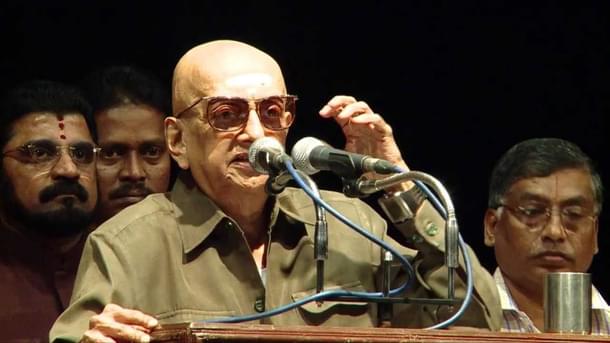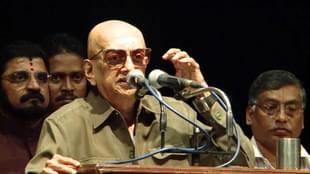Politics
Cho Ramaswamy: Outspoken Journalist, Political Satirist, Soothsayer And Much More
Aravindan Neelakandan
Dec 07, 2016, 05:44 PM | Updated 05:44 PM IST
Save & read from anywhere!
Bookmark stories for easy access on any device or the Swarajya app.


A lawyer, drama and cine-artist, political satirist, journalist and strategist, Cho Ramaswamy was a versatile mind with multiple talents. However, all these qualities centered around one thing - politics. He became widely known for his Tamil magazine Thuglak. The name derives from a political satire he wrote ''Muhammad bin Thuglak'', which became a success as stage drama and later was made into a movie.
It was not a smooth run for Cho; Dravida Munnetra Kazhagam (DMK) targeted his magazine because of the no-nonsense report he published about the ridicule Dravidian politicians heaped on Hindu deities at the notorious 1971 Salem procession of DK (Dravidar Kazhagam). The DMK government had given permission to conduct the rally despite knowing the full intention and modes of the campaign. The participants of the procession according to one report had even 'brandished weapons' to keep the protesting public at bay. When Cho published the photographs of this procession in his magazine, the DMK government conducted a police raid in the magazine office and seized 100,000 copies of the issue. Ironically, the DMK government, which gave permission for the rally, declared that the photographs of the tableaux during the demonstration as 'obscene'. For Cho, that was mission accomplished.

He continued his valiant fight for freedom of the press, when raising the voice for freedom was really a life-threatening prospect. He bravely battled the emergency of 1975. A vociferous critic of the DMK regime, he refused to criticise the party, which was then against the Congress, and would soon be dismissed by the Indira Gandhi government. He wrote that it would be a cowardly act to use the freedom to criticise DMK when the censor authorities were not allowing him to criticise the central government.
He stood with the efforts to create the Janata Party - a coalition against the Congress regime. He also crossed swords with the MGR government. His magazine always published cartoons on the front cover which criticised political personalities, right, left and centre. Not many took it lightly. Once, the Tamil Nadu legislature under MGR rule, seriously debated taking action against him.

Cho also played pranks exposing the gullibility of people as well as politicians. On one occasion, he ran a novel series in his magazine - an adaptation of The Tale of two Cities in the context of the Indian Independence movement. Every weekly piece started with a quote from Chanakya's Arthashastra - the Tamil meaning and the Sanskrit original. They became so popular and they were also so apt for the situation developing the novel series that fortnight. Many people started using these Chanakya quotes. They were republished and used in lectures. Then at the fag end of the series, Cho revealed that the quotes were his own and the so-called Sanskrit verses he used were meaningless Sanskrit sounding gibberish. Even the so-called educated literate people were never ready to check with the original and see for themselves the truth, he pointed out.
His readers mostly took in the right sense the pranks he played on them.
In another prank, he asked the opinion of the MLAs about a non-existent problem or project. While only a few MLAs openly stated that they knew nothing about such (non-existent) projects, most gave detailed answers explaining why they supported or objected to a particular fictional project or question. Soon many political parties warned their legislators not to answer Thuglak lest they made a fool of themselves. When politicians made ridiculous to silly statements, he asked his readers to money order them five paise. For example, Sathyavani Muthu, a DMK minister, made a statement that she could prove authentically that Dr B R Ambedkar was a DMK member. She was sent five paise as award. Even Indira Gandhi, MGR and Shankar Dayal Sharma were sent five paise each.

During the heydays of Indo-Soviet bonhomie, Cho wrote a series of articles titled 'Our Capital is Not Delhi but Moscow' in which he explained in detail the exploitation which Soviet Union was subjecting India to in the name of friendship. India was slowly but steadily becoming a Soviet satellite, Cho pointed out. He was one of the earliest journalists in Tamil Nadu to say openly that Soviet Union was not the golden utopia it was painted here. He particularly stated that the farmers were facing severe human rights violations and almost predicted that the Soviet Union might one day crumble.
When Indian political parties attacked him, sometimes in a third rate manner, he gleefully published them - deriving pleasure in exposing their real nature. He was one of the earliest popular journalists in Tamil Nadu to praise the Rashtriya Swayamsevak Sangh (RSS). Yet, he was very critical of some of the virulent voices emanating from the Sangh. One person, whom his reporters castigated for violent language used against minorities, in one of the earliest Hindu unity conferences organised by Sangh Parivaar in Tamil Nadu, was Madurai Atheenam. Sure enough later Hindu activists discovered Atheenam to be more a liability to the Hindu cause rather than an asset. He also published some of the earliest reports on the secessionist activities of missionaries in South India.
Thuglak had this 'one-and-a-half page magazine' pullout which satirically predicted what would happen in politics. In retrospect, their accuracy of the past political satire becoming a real possibility in the present unnerves a reader of old issues. In these 'future magazines' is a competition to the quatrains of Nostradamus. For example, he satirises the highly cinema-influenced histrionics MGR indulged in: 'His inspection of first file made into a public event! Comrade! Blood of my blood come and attend the public function of MGR seeing the first file as Chief Minister'! In 1977 that was a hilarious joke but now with Arvind Kejriwal that is a threatening possibility for Delhiites!
He had better working relations with Rajiv Gandhi. He strongly opposed the LTTE (Liberation Tigers of Tamil Eelam) and supported the India-Sri Lanka accord signed between Gandhi and J R Jayawardene, then premier of Sri Lanka. At one point, there was even a death threat to his life. In 1992, when the controversial structure was pulled down at Ayodhya, Cho came out with a black cover for his magazine. The only other occasion in which he brought out a black cover was when Emergency was declared. Cho had supported the Rama Janma Bhoomi movement, but he completely rejected the way in which the crowds pulled down the controversial dome of the functional temple at Ayodhya. An embittered Cho even gave Mani Shankar Iyer, the pseudo-secularist, a regular column in his magazine. However, soon he reverted to his soft support stand towards the BJP, which would later become stronger. He used to conduct the anniversary functions of his magazine as an extraordinarily successful public event. It was on one such event that Cho made his now historical introduction of Narendra Modi 'as the merchant of death for terrorism; merchant of death for corruption' and as they say the rest became history. Perhaps, it was one of the earliest functions that announced Modi as a pan-India figure - a possible future prime ministerial candidate for the BJP.

He had also opposed Jayalalithaa, when during her 1991-96 rule, she became extremely arrogant and was perceived corrupt. Though she was a very close friend to him, nothing stopped him from working overtime to forge an alliance against her. Soon after DMK became equally or even more corrupt along with its venom towards the Hindus, Cho later became somewhat an uncritical supporter of Jayalalithaa. As he became more and more ill towards the end of his life, Thuglak, which was once known for its strident impartial sarcasm, began to look like an AIADMK party magazine. With a self-imposed ideological inability to criticise Jayalalithaa, Thuglak started losing its original charm.
Vintage Cho will always live in our memories as a guide for fearless ethical journalism - a need for all times - and hence as Cho passes into eternity he becomes one of the classical icons of modern India for many decades if not centuries to come.
Aravindan is a contributing editor at Swarajya.




